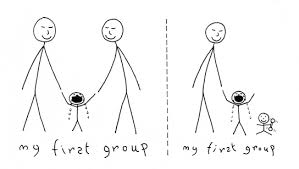Group conflict: the “shadow side”
Groups can have both a positive side, and there is evidence to show that individuals with some dysfunctionality can still collectively achieve tremendous things; the sum is greater than the parts. Groups can also have a negative side, which most people experience at some point as part of a group in their lives.
Nitsun talks in his book about the concept of the “anti group”: one of the challenges of being part of a group is that you have to share and this takes time to work through and find a mutual balance of input. The anti group concept suggests that individuals within the group need to test or even try to sabotage the group, in order to see how safe it is, and whether it will “contain” them.
We can all probably think of instances where one person in “wrecking mode” (which may not even be conscious and interpreted by them as challenge or helpfulness) creates a disproportinate level of chaos and takes up a lot of time in the group. I came across an instance a while back where this had taken place over a period of months, and many people in the group were aware and talking to each other in 2,s and 3,s about how awful this person was in creating problems, but there was little collective stomach to really challenge the individual over the behaviour.
The effectiveness of groups is also dependent on the collective cohesion of the whole group, the level of focus on what it is there to do, and whether it can hold all the sometimes disparate agendas of individuals into a stronger whole. Factions or sub groups very often emerge, some of them “in groups” with lots of power and influence, and some “out groups” that feel excluded and create mini groups within the larger group. It’s fascinating to watch and listen to the teenage world of my daughter to see who is in and out of groups, and how quickly the landscape changes!
Personal thoughts on groups
 A lot of our approach to groups traces back to our original family group. I was brought up in a family of 5 children, the middle one with an older brother and sister several years older and younger twin brothers. I am convinced that my work as a facilitator and fulcrum of the groups I run for work, whether in Leadership or team building, uses skills learnt early in life.
A lot of our approach to groups traces back to our original family group. I was brought up in a family of 5 children, the middle one with an older brother and sister several years older and younger twin brothers. I am convinced that my work as a facilitator and fulcrum of the groups I run for work, whether in Leadership or team building, uses skills learnt early in life.
It also probably explains some of my ambivalence about groups, preferring to be at the edge of them in a facilitating role, rather than right in the centre. Over the years I have become reconciled to this, and comfortable; it’s just helpful to have this awareness.
There is always the danger of stereotyping, but I personally have tended to find all male groups competitive in terms of holding the “conch” (the extreme of this behaviour in the brilliant book Lord of the flies, one upmanship based, and potentially harsh in humour to certain members. All female groups can be hard on each other but not directly, preferring quiet words with somebody else in the group about the person/people they struggle with; they tend to struggle with outright conflict. This isn’t to say that there aren’t wonderful work and friendship single sex groups. Ultimately, my perspective would be that the “blend” of male/female seems to work well in integrating the best of the genders, which softens the edges of all one gender.
 Its worth mapping out what your significant groups are, to reflect on both their positivity for you, and what role you play as part of the groups; is there a pattern, or are you a different person in each group? Do you find sustenance from them, or do they drain you? What level of choice do you have to be part of them?
Its worth mapping out what your significant groups are, to reflect on both their positivity for you, and what role you play as part of the groups; is there a pattern, or are you a different person in each group? Do you find sustenance from them, or do they drain you? What level of choice do you have to be part of them?
Examples of significant groups for me currently are:
- Immediate Family
- Extended family (birth family and extended family of nephews, nieces etc.)
- Institute of Group Analysis training group
- “Demist” self employed network group
- Several work groups based on medium and long term projects am involved with
Practical links/resources
• Stakeholder review of your working groups; which work and don’t work so well
• The “4I’s” exercise looking at aspects of who we are in groups: our identity in groups, our level of influence, our level of intimacy, and our idealogy and values in relation to the group
